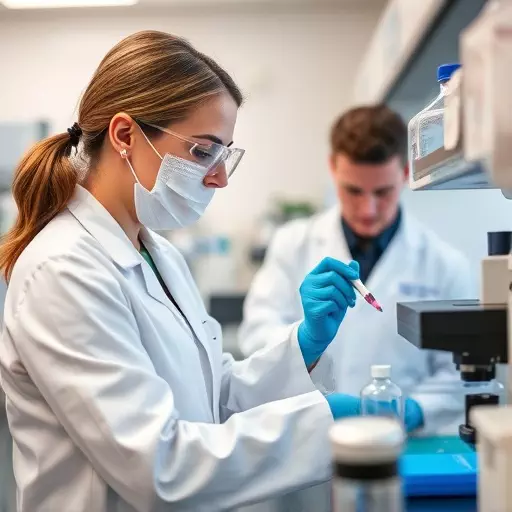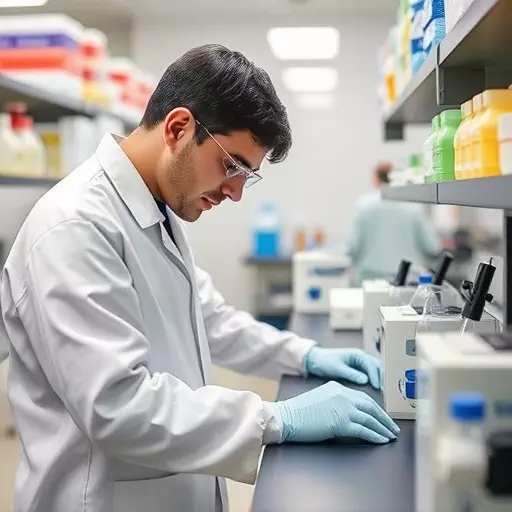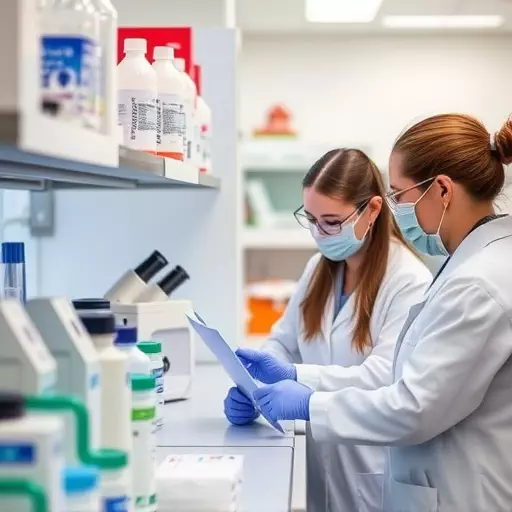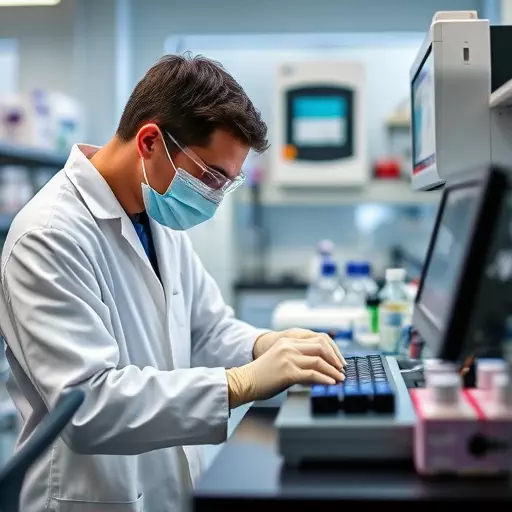In Fort Wayne-Huntington-Auburn's thriving precision medicine scene, bioinformatics analysts are indispensable experts who bridge the gap between complex biological data from lab work (like NGS and cytogenomic platforms) and clinical applications. Their skills in interpreting genomic sequences and identifying genetic variations drive personalized treatment strategies. Pursuing a career in advanced cytogenetic analysis within these dynamic labs offers exciting opportunities for aspiring scientists, addressing a growing demand for skilled professionals who combine technical expertise with scientific understanding to improve patient care through effective teamwork and communication. Ethical considerations, including data privacy, are paramount as these specialists safeguard patients' genetic information under stringent regulations like HIPAA.
“Dive into the dynamic world of academic precision medicine laboratories, where groundbreaking research and innovative technologies converge. This article explores diverse roles within these specialized settings, from lab work in Fort Wayne-Huntington-Auburn to the evolving expertise required. We delve into emerging roles for bioinformatics analysts, advanced cytogenetic analysis techniques, and crucial data management skills. Additionally, we uncover ethical considerations and patient privacy concerns in a field that demands both scientific rigor and empathetic collaboration.”
- Understanding the Landscape: Lab Work in Fort Wayne-Huntington-Auburn and Beyond
- The Evolving Role of Bioinformatics Analysts in Genomic Labs
- Unlocking Complexities: Advanced Cytogenetic Analysis Techniques and Career Opportunities
- Data Interpretation and Management: Skills Required for Success
- Collaboration and Communication: Building a Supportive Lab Environment
- Training and Education: Nurturing Expertise in Precision Medicine
- Ethical Considerations and Patient Privacy: Navigating Delicate Issues
Understanding the Landscape: Lab Work in Fort Wayne-Huntington-Auburn and Beyond

In the dynamic field of precision medicine, the Fort Wayne-Huntington-Auburn metropolitan area stands out for its thriving academic laboratories that are at the forefront of groundbreaking research. These institutions offer a diverse range of roles, particularly in lab work, where professionals contribute to understanding and treating diseases with unprecedented accuracy. The landscape here is rich with opportunities, catering to emerging roles such as bioinformatics analysts who play a pivotal role in interpreting complex genomic data. With advanced tools and technologies at their disposal, these analysts are instrumental in unravelling the intricate relationship between genetic information and disease susceptibility.
For those pursuing a career in advanced cytogenetic analysis, this region presents a unique allure. The demand for specialists capable of studying chromosomal structure and function is on the rise, as precision medicine continues to evolve. Lab work in Fort Wayne-Huntington-Auburn involves intricate procedures that require meticulous attention to detail, cutting-edge skills, and a passion for discovery. Professionals in these laboratories contribute to the advancement of medical knowledge, ensuring that treatments are tailored to individual genetic profiles, ultimately enhancing patient outcomes and quality of life.
The Evolving Role of Bioinformatics Analysts in Genomic Labs

In the dynamic landscape of precision medicine research, particularly within academic laboratories across Fort Wayne-Huntington-Auburn, the role of bioinformatics analysts is undergoing a profound evolution. As genomic sequencing and advanced cytogenetic analysis techniques become increasingly integral to healthcare practices, these professionals are at the forefront of interpreting vast amounts of complex biological data. Their expertise in bioinformatics tools and algorithms enables them to extract meaningful insights from genomic datasets, bridging the gap between raw data and actionable clinical information.
Bioinformatics analysts play a pivotal role in supporting researchers throughout various lab work processes, from initial data acquisition to final interpretation. They contribute to the development and refinement of computational methods for analyzing genetic variations, helping to identify potential disease-causing mutations or indicators for personalized treatment strategies. Pursuing a career in this field not only offers exciting opportunities in academic research but also contributes significantly to advancing medical understanding, ultimately enhancing patient outcomes in the realm of advanced cytogenetic analysis.
Unlocking Complexities: Advanced Cytogenetic Analysis Techniques and Career Opportunities

In the realm of academic precision medicine laboratories, advancing techniques in cytogenetic analysis have unlocked complex genetic mysteries that were once elusive. Fort Wayne-Huntington-Auburn labs are at the forefront of this revolution, where sophisticated technologies such as next-generation sequencing (NGS) and advanced cytogenomic platforms enable researchers to unravel intricate genomic structures. These breakthroughs have led to emerging roles for bioinformatics analysts who play a pivotal part in interpreting vast amounts of genetic data. By merging computational power with biological insights, they contribute to the development of personalized treatments.
Pursuing a career in advanced cytogenetic analysis promises exciting opportunities within these dynamic labs. As genomic research continues to evolve, the demand for skilled professionals who can bridge the gap between molecular biology and bioinformatics is on the rise. In this context, Fort Wayne-Huntington-Auburn serves as an ideal hub for aspiring scientists eager to contribute to cutting-edge discoveries in precision medicine.
Data Interpretation and Management: Skills Required for Success
In the dynamic landscape of precision medicine research, effective data interpretation and management are paramount. This involves a multifaceted approach where skilled professionals meticulously analyze complex genomic data generated from lab work in Fort Wayne-Huntington-Auburn. Emerging roles for bioinformatics analysts within genomic labs play a pivotal role in translating raw data into actionable insights. These experts utilize cutting-edge tools and methodologies to interpret results, ensuring accuracy and reliability in advanced cytogenetic analysis.
Pursuing a career in this domain requires a blend of technical proficiency and scientific acumen. Bioinformaticians must be adept at programming languages like Python or R for data manipulation and visualization. Proficiency in database management systems and knowledge of genomic sequencing technologies are also crucial. Additionally, strong communication skills are essential to collaborate with scientists and clinicians, as interpreting data accurately and conveying findings clearly can have significant implications for patient care and treatment outcomes.
Collaboration and Communication: Building a Supportive Lab Environment

In academic precision medicine laboratories, collaboration and communication are cornerstones that foster innovation and excellence in lab work in Fort Wayne-Huntington-Auburn. Effective teamwork ensures that diverse expertise—from clinical researchers to bioinformaticians and advanced cytogenetic analysts—converges towards shared goals. Emerging roles for bioinformatics analysts, for instance, play a pivotal part in interpreting complex genomic data, enabling scientists to uncover insights that were previously hidden. This seamless integration of skills requires open lines of communication, where ideas are freely exchanged, challenges are collectively addressed, and knowledge is continuously shared among team members.
A supportive lab environment, built on collaboration, enhances the pursuit of a career in advanced cytogenetic analysis. Here, professionals can refine their skills, engage in interdisciplinary projects, and contribute to groundbreaking research that impacts patient care. As precision medicine continues to evolve, the role of communication and teamwork becomes even more critical, shaping the future of genomic labs and driving progress in healthcare.
Training and Education: Nurturing Expertise in Precision Medicine

In the dynamic landscape of precision medicine, training and education play a pivotal role in nurturing expertise among lab professionals. Fort Wayne-Huntington-Auburn’s academic institutions and research facilities offer specialized programs tailored to the unique demands of this field. These programs equip students with a deep understanding of genomic sequencing, bioinformatics, and advanced cytogenetic analysis—essential skills for contributing to cutting-edge lab work in Fort Wayne-Huntington-Auburn.
Emerging roles for bioinformatics analysts within genomic labs are reshaping the landscape of precision medicine. As these laboratories delve deeper into the complexities of genetic data, there’s an increasing need for analysts who can interpret vast amounts of information and translate it into actionable insights. Pursuing a career in advanced cytogenetic analysis, therefore, presents an exciting opportunity for those interested in driving innovation in healthcare through precise, personalized treatments.
Ethical Considerations and Patient Privacy: Navigating Delicate Issues

In the realm of academic precision medicine laboratories, where lab work in Fort Wayne-Huntington-Auburn plays a pivotal role, ethical considerations and patient privacy are navigating delicate issues. As emerging roles for bioinformatics analysts in genomic labs gain prominence, pursuing a career in advanced cytogenetic analysis becomes increasingly vital. These specialists must ensure the security and confidentiality of patients’ genetic data, adhering to stringent regulations such as HIPAA (Health Insurance Portability and Accountability Act) to maintain trust and integrity.
The intricate nature of lab work demands meticulous attention to ethical standards, especially when dealing with sensitive genomic information. Bioinformatics analysts are increasingly involved in interpreting complex data generated from advanced cytogenetic analyses, which can reveal crucial insights into an individual’s health. Protecting this data from unauthorized access or misuse is paramount, fostering a culture of transparency and responsible research practices within the laboratory environment.
